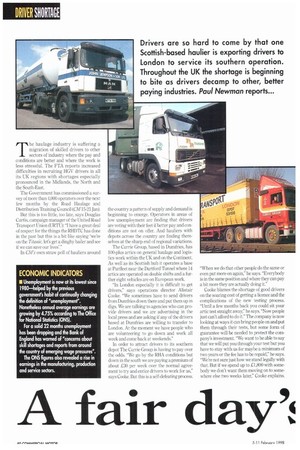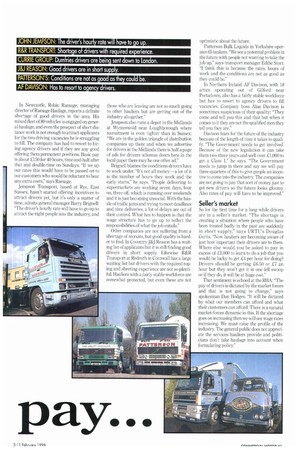A fair day'!
Page 42

Page 43

If you've noticed an error in this article please click here to report it so we can fix it.
pay...
Drivers are so hard to come by that one Scottish-based haulier is exporting drivers to London to service its southern operation. Throughout the UK the shortage is beginning to bite as drivers decamp to other, better paying industries. Paul Newman reports...
The haulage industry is suffering a migration of skilled drivers to other sectors of industry where the pay and conditions are better and where the work is less stressful. The FTA reports increased difficulties in recruiting HGV drivers in all its UK regions with shortages especially pronounced in the Midlands, the North and the South-East.
The Government has commissioned a survey of more than 4,000 operators over the next few months by the Road Haulage and Distribution Training Council (CM 15-21 Jan).
But this is too little, too late, says Douglas Curtis, campaign manager of the United Road Transport Union (URTLT): "I have a great deal of respect for the things the RHDTC has done in the past but this is a bit like saying 'we're on the Titanic, let's get a dinghy bailer and see if we can save our lives'."
In CM's own straw poll of hauliers around the country a pattern of supply and demand is beginning to emerge. Operators in areas of low unemployment are finding that drivers are voting with their feet if better pay and conditions are not on offer. And hauliers with depots across the country are finding themselves at the sharp end of regional variations.
The Currie Group, based in Dumfries, has 100-plus artics on general haulage and logistics work within the UK and on the Continent. As well as its Scottish hub it operates a base at Pm-fleet near the Dartford Tunnel where 14 artics are operated on double shifts and a further eight vehicles are on European work.
"In London especially it is difficult to get drivers," says operations director Alistair Cooke. "We sometimes have to send drivers from Dumfries down there and put them up in digs. We are talking to agencies who can provide drivers and we are advertising in the local press and are asking if any of the drivers based at Dumfries are willing to transfer to London. At the moment we have people who are volunteering to go down and work all week and come back at weekends."
In order to attract drivers to its southern depot The Currie Group is having to pay over the odds, "We go by the RHA conditions but down in the south we are paying a premium of about .C30 per week over the normal agreement to try and entice drivers to work for us," says Cooke. But this is a self-defeating process. "When we do that other people do the same or even put more on again," he says. "Everybody is in the same position and where they can pay a bit more they are actually doing it."
Cooke blames the shortage of good drivers on the soaring cost of getting a licence and the complications of the new testing process. "Until a few months back you could sit your artic test straight away," he says. "Now people just can't afford to do it." The company is now looking at ways it can bring people on and put them through their tests, but some form of guarantee will be needed to protect the company's investment. "We want to be able to say that we will put you through your test but you have to stay with us for maybe a minimum of two years or the fee has to be repaid," he says. "We're not sure just how we stand legally with that. But if we spend up to .£1,800 with somebody we don't want them moving on to somewhere else two weeks later," Cooke explains.
In Newcastle, Robin Ramage, managing director of Ramage Haulage, reports a definite shortage of good drivers in the area. His mixed fleet of 80 vehicles is engaged on general haulage, and even the prospect of short distance work is not enough to attract applicants for the two driving vacancies he is struggling to fill. The company has had to resort to hiring agency drivers and if they are any good offering them permanent positions. Basic pay is about £150 for 40 hours, time-and-half after that and double-time on Sundays. "If we up OUT rates this would have to be passed on to our customers who would be reluctant to bear any extra costs," says Ramage.
Jempson Transport, based at Rye, East Sussex, hasn't started offering incentives to attract drivers yet, but it's only a matter of time, admits general manager Barry Brignell: "The driver's hourly rate will have to go up to attract the right people into the industry, and those who are leaving are not so much going to other hauliers but are getting out of the industry altogether."
Jempson also runs a depot in the Midlands at Wymeswold near Loughborough where recruitment is even tighter than in Sussex: "We are in the golden triangle of distribution companies up there and when we advertise for drivers in the Midlands there is half a page of ads for drivers whereas down here in the local paper there may be one other ad."
Brignell blames the conditions drivers have to work under. "It's not all money—a lot of it is the number of hours they work and the early starts," he says. "People delivering to supermarkets are working seven days, four on, three off, which is running over weekends and it is just becoming unsocial. With the hassle of traffic jams and trying to meet deadlines and time deliveries, a lot of delays are out of their control. What has to happen is that the wage structure has to go up to reflect the responsibilities of what the job entails."
Other companies are not suffering from a shortage of recruits, but good quality is harder to find. In Coventry J&J Reason has a waiting list of applicants but it is still finding good drivers in short supply. Likewise R&R Transport at Redruth in Cornwall has a large waiting list but drivers with the required roping and sheeting experience are not so plentiful. Hauliers with a fairly stable workforce are somewhat protected, but even these are not optimistic about the future.
Patterson Bulk Liquids in Yorkshire operates 65 tankers. "We see a potential problem in the future with people not wanting to take the job up," says transport manager Eddie Storr. "I think this is because the rates, hours of work and the conditions are not as good as they could be."
In Northern Ireland AF Davison, with 18 artics operating out of Gilford near Portadown, also has a fairly stable workforce but has to resort to agency drivers to fill vacancies. Company boss Alan Davison is sometimes suspicious of their quality: "They come and tell you this and that but when it comes to it they are not the qualified men they tell you they are."
Davison fears for the future of the industry because of the length of time it takes to qualify. "The Government needs to get involved. Because of the new legislation it can take them two-three years and well over £1,000 to get a Class 1," he says. "The Government needs to jump in there and say we will pay three-quarters of this to give people an incentive to come into the industry. The companies are not going to pay that sort of money just to get new drivers so the future looks gloomy. Also rates of pay will have to be improved."
Seller's market So for the first time for a long while drivers are in a seller's market. "The shortage is creating a situation where people who have been treated badly in the past are suddenly in short supply," says URTU's Douglas Curtis. "Now hauliers are becoming aware of just how important their drivers are to them. Where else would you be asked to pay in excess of £1,000 to learn to do a job that you would be lucky to get .C4 per hour for doing? Drivers should be getting £6.50 or .0 an hour but they won't get it in one fell swoop or if they do, it will be at huge cost."
That sentiment is echoed at the RHA: "The pay of drivers is dictated by the market forces and that is not going to change," says spokesman Dan Hodges. "It will be dictated by what our members can afford and what their customers can afford. There is a natural market-forces dynamic in this. If the shortage goes on increasing then we will see wage rates increasing. We must raise the profile of the industry. The general public does not appreciate the services hauliers provide and politicians don't take haulage into account when formulating pol icy."
ECONOMIC INDICATORS
Unemployment is now at its lowest since 1980—helped by the previous government's habit of continually changing the definition of "unemployment". Nonetheless annual average earnings are growing by 4.75% according to The Office for National Statistics (ONSi.
For a solid 22 months unemployment has been dropping and the Bank of England has warned of "concerns about skill shortages and reports from around the country of emerging wage pressures".
The ONS figures also revealed a rise in earnings in the manufacturing, production and service sectors.








































































































